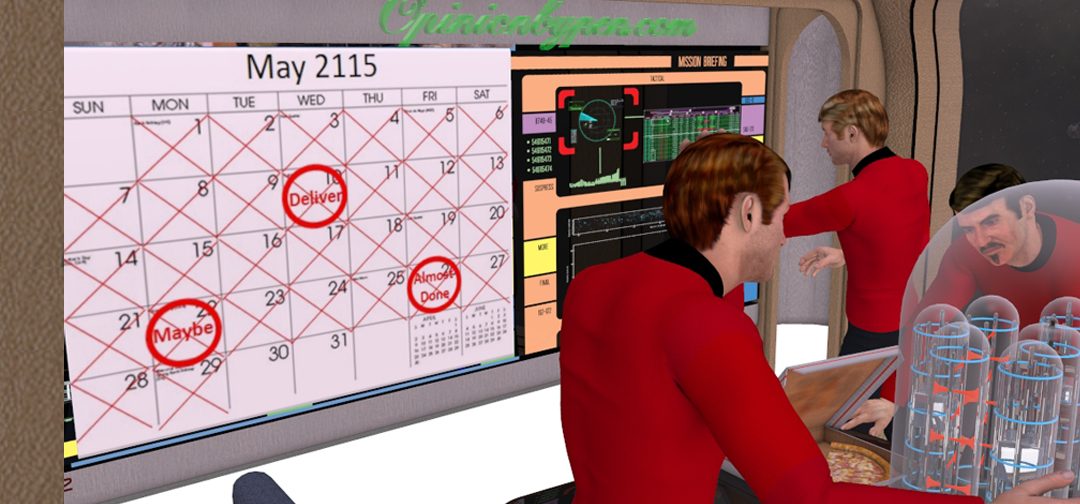For a marketing person, introducing a potential customer to an engineer is the stuff nightmares are made from. Engineers can be brutally honest about technology. Note I said technology. We’re perfectly capable of lying. Ask us about schedule, percent complete, does this dress make me look fat…. On second thought, we’re not always good about recognizing those socially awkward questions, best not ask that last one.
When you’re talking to an engineer you need to understand the guidelines behind his answers. For example, ask an engineer if anti-gravity is possible and they will say yes. This really means that your engineer is not aware of any physical laws prohibiting anti-gravity. Although not truly antigravity, most of them have already started considering various arrangements of magnets.
Why would this give a marketing person nightmares? When your customer asks if the new XYG127 generator is really capable of producing 5 gigawatts, the engineer wants to demonstrate his knowledge of technology. The answer could be anything from, “That’s only peak power before it self destructs,” to, “yes, but the temperature has to be minus 20 or it goes into thermal shutdown around 4 gigawatts.”
There’s also the dreaded, “Yes, but if you want to save $200,000 all you have to do is buy the XYG122 and flash the XYG127 software available for free on our website.”
Points to remember, the engineer wants to demonstrate knowledge of technology and wants to be helpful. Careful prepping by the marketing person can forestall many of these disasters but this is usually detectable by the engineer’s quick glance at his handler before answering. Even then there’s always a risk.
On the other hand, most program managers are thoroughly convinced that engineers always lie. That’s not true either but they have to understand why the answers they get don’t represent the reality they wanted.
I always hated it when I was trying to resolve a problem and someone asked me how long before i had a fix. Let me rephrase that, by virtue of asking that question, the person was immediately relegated to the clueless category and any answer I gave was only to make them go away and quit wasting my time with stupid questions. In case you wonder why I abhorred those questions, read my post on The Zone. A single question can cost destroy an entire day’s progress.
Schedule is another of those dicey situations. In a typical situation, the engineer is asked to develop a schedule. The program manager will then shorten the schedule based on his need and experience. When the engineer is asked about schedule, he will always answer based on his original schedule. The schedule being tracked by the program manager seldom represents any commitment by the engineer.
Percent complete or how much longer provides another opportunity for misunderstood answers. Percent complete is always answered from the engineer’s viewpoint. Such things as documentation, testing, software integration and anything else the engineer is not directly responsible for is completely ignored. I should mention there’s also a huge amount of wishful thinking that goes into those answers.
Answers to how much longer include all the previous factors as well as the engineer’s assumption that this is his only task and the people asking him how much longer will leave him alone to complete his tasks. We both know that’s wishful thinking but that’s how the engineer interpreted the question.
I know you’re probably not in marketing or program management trying to deal with engineers. It’s more likely you are married or involved with one. The thing is, these principles still give you insight into the answers you get and the questions you should ask.
“When you ask does this dress make me look fat,” the response is based on how the engineer categorizes the question. If a social response is required, the answer is “No.” If a technical response is required, the answer is closer to the truth but, you still have to consider the response. Fat to you, is not necessarily fat to your engineer.
There is of course one other interpretation possible when the engineer answers no. The engineer has carefully evaluated his social responsibilities and has no opinion on this subject. The dress does not change his opinion of you and in that case, the answer will be no.
If the answer was “Yes,” try not to get insulted, remember the engineer thought you were comfortable with the actual answer and trusted you enough to give you a truthful reply. Get upset with the answer and all your future responses will be based on social responses.
If you really want a truthful answer and you haven’t already preconditioned his responses with a negative emotional outburst to a previous answer, ask him if the dress makes you appear fat to other people. Be prepared, this answer will be judged as requiring a technical response and carefully evaluated on that basis. Well, you asked.
I hope this helps. We do tell the truth whenever possible. It’s just that the real world is nothing like the technical world engineers live in.
© 2020, Byron Seastrunk. All rights reserved.











Recent Comments